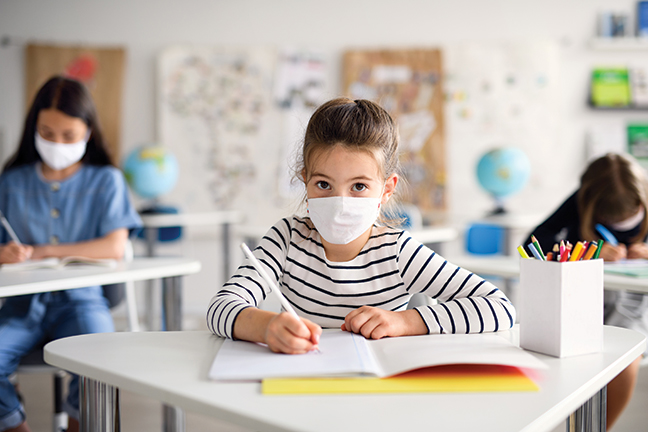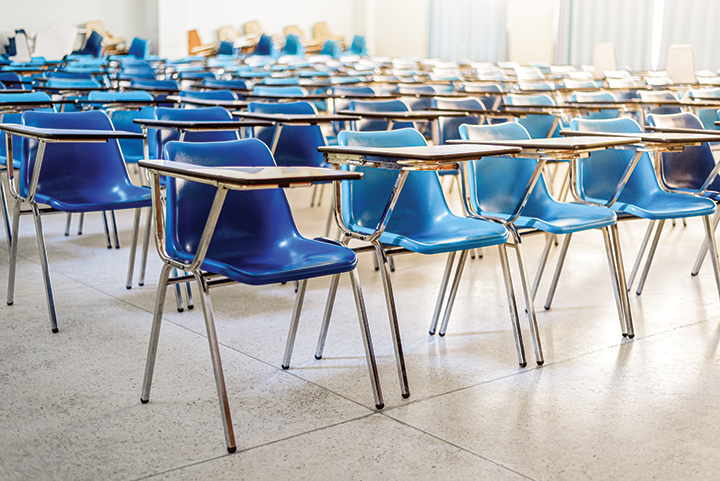BY ANONYMOUS DPS EDUCATOR
I’m a parent to two DPS students. I’m also an educator who has dedicated my life’s work to improving the lives’ of inner-city students in Denver. What I’m not, though, in these times of global pandemic, is a martyr.
I, too, struggle with the decision of what to do with my kids’ education (and my employment) when school in Denver re-opens for students and teachers on August 24th. Along with many others in the Denver community (educators and families alike), I was stunned when DPS announced in June that instruction would come in the form of 100% “In-Person” learning to begin the 2020 school year with an on-line “option;” it felt as if the entire pandemic had been arbitrarily dismissed. Meanwhile, my family had still been practicing strict elements of Social Distancing and Quarantine. At one point, when my child heard this news, their response was, “why can’t I see my friends now if I’m gonna’ be stuffed into a packed room with strangers in August?” Touché, kid. Fortunately, DPS re-evaluated the status of the ever-changing COVID crisis to announce that the first two weeks of the new school year will begin where 2019/2020 left off: Remote Learning. Other local school districts (as Aurora Public Schools recently announced) will soon join DPS in this decision as it is straight-up unsafe to send our children (and teachers, para-professionals, administrators, transportation specialists, facility and support staff) into crowded, poorly ventilated, sweltering classrooms despite society heavily discouraging similar actions in nearly ALL other settings. To fill in this picture, envision this: no restaurant in the state is allowed to exceed over 50% capacity. Bars, again, will soon close. Doctor’s offices continue to encourage “virtual appointments,” while no concert venue in the state may exceed over 175 attendees. So, why in the HELL is education being viewed as the social experiment to determine what is safe and what isn’t in our society? This thinking defies reality.
 Cost/Benefit experiments with the lives of our children and their trusted mentors makes zero sense. Kudos to Denver Public Schools’ leadership (including new School Board Members) for being the first district in the state to step-up to say no, we won’t roll the dice with the lives of our community. We won’t fall in-step to the Secretary of Education’s (or her boss’) game plan that every school must open, 100% in less than a month’s time just because they theoretically can. Expect many districts to soon follow DPS’ footprint. The answer, then, Remote Learning, is the only viable option to begin the school year. And that, too, includes many downsides.
Cost/Benefit experiments with the lives of our children and their trusted mentors makes zero sense. Kudos to Denver Public Schools’ leadership (including new School Board Members) for being the first district in the state to step-up to say no, we won’t roll the dice with the lives of our community. We won’t fall in-step to the Secretary of Education’s (or her boss’) game plan that every school must open, 100% in less than a month’s time just because they theoretically can. Expect many districts to soon follow DPS’ footprint. The answer, then, Remote Learning, is the only viable option to begin the school year. And that, too, includes many downsides.
Like most educators, I worked hard during last year’s period of Distance Learning. Just trying to retain any sense of normalcy in times of such rapid, terrifying change took its toll on my students, my own children, and my family in general. I found myself grading, constantly, just to show my students that I was engaged, that I was concerned, that I cared. Sadly, though, many students (my own included) lost motivation early on. My spouse, whom, fortunately for us, works from home, took on the role of “headmaster/headmistress,” and felt the constant responsibility to stay on top of our kids’ grades. One problem, though, was that both schools’ our kids’ attend took on a similar approach with the expectation that the kids would assume responsibility for their education. That didn’t happen, and my partner was on edge, ensuring that the daily work was completed. Many people in our DPS community, though, lack the ability to stay home with their children, and the kids are left to fend for themselves; often the older siblings become responsible for maintaining the learning for the younger students in the house at the peril of their own studies. Our most vulnerable students become even more jeopardized for a variety of reasons: whether it’s a child on an IEP (Individualized Education Plan) with unique, specialized learning needs, a single-parent household that lacks the ability to oversee their child’s studies due to their own need to work, or dysfunction of any kind (lack of food, abuse, isolation, negligence). The list is painfully long. I feel particularly concerned for our youngest learners, those kids still so young that they lack fundamental literacy and math skills to engage meaningfully in a digitalized education. Yet, what other ‘choices’ do we have? Sure, younger students are less susceptible to contracting COVID. But, even before they feel symptomatic, the virus has traveled with them, leaving everyone in the home (and class) exposed.
As educators and parents, there is no ‘good’ answer to solve the myriad of issues the COVID-19 pandemic has thrust upon our lives. The safest response is to begin again with Remote Learning, hoping and trusting that we’ve learned from the previous experience. Our students and schools will suffer as young students will not receive the social-emotional supports they receive in school from professionals and peers, alike. Yet, Remote Learning is the safest way we have to proceed. Until there’s a way to scientifically demonstrate that it is safe to send our students and spouses off to work with limited fear that they will contract the potentially deadly virus at school, educating students at home is the most reasonable approach.

